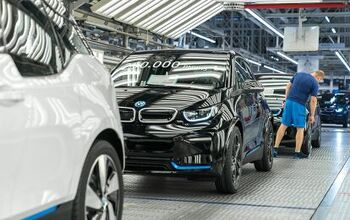Should the 60 MPG Car Become The Law?

U.S. passenger vehicles emit about 20 percent of the nation’s carbon emissions and consume about 44 percent of its oil. With that in mind, the Obama administration will reveal (some time this week, Thursday probably) its proposal for fuel efficiency and emissions requirements for cars and light trucks for model years 2017 and beyond.
According to Automotive News [sub], “leading environmental groups have called on the administration to set a target of 60 miles per gallon by 2025, but officials have said that is unlikely.” They should know, they own two car companies.
What is widely believed to be handed down are yearly average mileage increases, anywhere between 3 percent to 6 percent. The 60 mpg figure would require a roughly 6 percent annual improvement. If the 60 mpg standard were in place now, U.S. gasoline consumption would fall by roughly half to 1.6 billion barrels annually, says Consumer Federation of America Director of Research Mark Cooper.
Under current law, automakers must achieve 35.5 mpg by 2016, up 42 percent from current levels.

Bertel Schmitt comes back to journalism after taking a 35 year break in advertising and marketing. He ran and owned advertising agencies in Duesseldorf, Germany, and New York City. Volkswagen A.G. was Bertel's most important corporate account. Schmitt's advertising and marketing career touched many corners of the industry with a special focus on automotive products and services. Since 2004, he lives in Japan and China with his wife <a href="http://www.tomokoandbertel.com"> Tomoko </a>. Bertel Schmitt is a founding board member of the <a href="http://www.offshoresuperseries.com"> Offshore Super Series </a>, an American offshore powerboat racing organization. He is co-owner of the racing team Typhoon.
More by Bertel Schmitt

































Comments
Join the conversation
When I was in Spain in 1970 it cost US$1/litre for gas. Most cars had engines smaller than 1.0L and many of those were Diesel. Mass transit systems were full of riders. Today when I watch video of the morning commute in L.A. I see tens of thousands of cars on the freeways, most with engines of at least 2.0L, more or less idling their way to work while the buses running on the surface streets are almost empty. How foolish can you get and keep a straight face? There seems to be very little if any self control when it comes to conserving what isn't going to last for a whole lot longer. The government, or somebody, has to do something.
I'm naive to believe in individual responsibility based on the actual behavior of people, but I'd be much more naive to think that the government could do it better. For those advocating the government earmark gas tax money for only road programs, let me share something with you - they already have a gas tax and that money continually is looted to support the program du jour which happens to be anything but road improvement. Even when the Feds do announce things like "The Highway Bill", is it shocking to hear that it's so larded up with stuff that has nothing to do with road improvement? Bottom line - the government, like big corporations, should not be trusted. Regardless of how good it sounds, we do not have responsible leaders who will do the right thing. But there I go again preaching about individual responsibility. But you know, it's the lesser of the rest of the evils. For those still not convinced that gov't is an irresponsible spender, please name any program the government does more efficiently than the private sector save national defense and the justice system. Medicare, Medicaid, C4C, Education, any of them... if these were privately held companies or divisions, the CEO's and the executive teams would have been fired long ago for incompetence and mismanagement. Or, they would have gone broke because they wouldn't have enough customers.
Has anyone seen what's missing here? Over the last 30 years, cars have gotten extremely fuel-efficient, but gov't safety standards have forced cars to get heavier. More mass requires more energy to move. One force moving against the other, status quo. Although my 2005 Impala gets over 30 mpg hwy/24.5 mpg city, it weighs as much as a '58 Impala. Progress has been made, but for every two steps taken forward, one is taken back. Just my humble observation.
You want to give this outfit more of our tax money?-http://gatewaypundit.firstthings.com/2010/09/unreal-obama-says-gop-pledge-to-cut-spending-is-irresponsible/